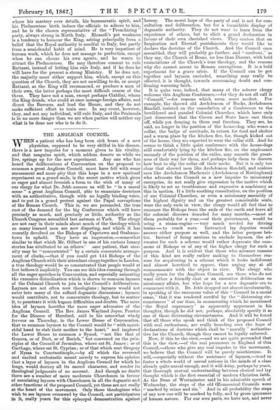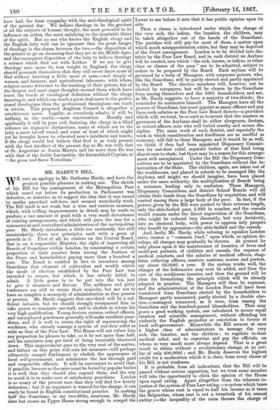THE ANGLICAN COUNCIL.
WHEN a patient who has long been sick hears of a new physician, supposed to be very skilful in his disease, there is a new impulse for a moment given to his vitality, and that sanguine spirit, which seldom deserts us while we live, springs up for the new experiment. Any one who has heard the deliberations of Convocation on the proposal to summon a great Anglican Council, must have felt with some amusement and more pity that this hope in a new spiritual experiment on a grand scale, is the secret motive which gives so eager and almost feverish a form to the wish of many of our clergy for what Dr. Jebb assures us will be " in a moral sense " a great Anglican Council, able to enunciate doctrines with an authoritative, though with no legally binding voice, and to put in a grand protest against the Papal corruptions of the Roman Church. This is, we are persuaded, the true root of the demand for the big Conference which will have precisely as much, and precisely as little, authority as the Church Congress assembled last autumn at York. The clergy are not easy in their minds about much of the theology which so many learned men are now disputing, and which it has recently devolved on the Bishops of Capetown and Grahams- town to uphold. They have an impression,—somewhat similar to that which Mr. Gilbert in one of his curious lunacy stories has attributed to an otherw'- sane patient, that eter- nity may be " concentrated " by a certain concentric arrange- ment of clocks,—that if you could get 144 Bishops of the Anglican Church with their attendant clergy together in London, a true theology would be so concentrated that people would at last believe it implicitly. You can see this idea running through all the eager speeches in Convocation, and especially animating the excessive disinclination which is shown to summon laymen of the Colonial Church to join in the Council's deliberations. Laymen are not often now theologians ; laymen would not enter into many of the refined dogmatic discussions ; laymen would contribute, not to concentrate theology, but to scatter it, to penetrate it with human difficulties and doubts. The mere idea of laymen horrifies the more eager advocates of the Anglican Council. The Rev. James Wayland Joyce, Proctor for the Diocese of Hereford, said in his somewhat windy fervour on Thursday, in the Lower House of Convocation, that to summon laymen to the Council would be " with matri- cidal hand to stab their mother to the heart," and implored the Lower House to summon a Synod, " not like that of Geneva, or of Dort, or of Zurich," but convened on the prin- ciples of the Council of Jerusalem, where sat St. James ; or of Carthage, where sat St. Cyprian; or of that which sent Gregory of Nyasa to Constantinople,—by all which the reverend and excited ecclesiastic meant merely to express his opinion that a layer of laymen in the Anglican Council for which he longs, would destroy all its sacred character, and render its theological judgments of no account. And though no doubt there are a number of more moderate Churchmen in favour of associating laymen with Churchmen in all the dogmatic and Other functions of the proposed Council, yet these are not really at the heart of the movement. Only those theologians who wish to see laymen overawed by the Council, not participators in it, really yearn for this episcopal demonstration against
heresy. The secret hope of the pasty of zeal is not for con- sultation and deliberation, but for a formidable display of dogmatic authority. They do not want to learn from the experience of others, but to elicit a grand declaration in favour of their own cherished views. They confess that on Inspiration and Eternal punishments they would like to declare the doctrine of the Church. And the Council once assembled, they will probably go further, and " confront," as they say, the Church of Rome, no less than Dissent, with bold enunciations of the Church's true theology, and the reasons why she cannot assent to Roman corruptions. It is a bold experiment for a grave crisis. If the Council can be got together and laymen excluded, something may really be effected, it is thought, towards overcoming doubt and con- firming wavering faith.
It is quite true, indeed, that many of the soberer clergy welcome this Anglican Conference,—for they do not all call it "Council,"—for reasons which seem more modest. For example, the shrewd old Archdeacon of Bucks, Archdeacon Randall, insisted on the consolation of a Conference to the bewildered and puzzled Colonial Churches, which have only just discovered that the Crown and State have cast them off, while yet denying to them real freedom. They are, he said, no longer in the position of the house-dog, who wears a collar, the badge of servitude, in return for food and shelter and a warm place by the kitchen fire, for, though kicked out of the house, they are expected to wear the collar still. And he seems to think a little quiet conference with the house-dogs still comfortably lying by the kitchen fire, on the unpleasant anomaly of the position of the exiles, may smooth the great- ness of their way for them, and perhaps help them to discern how best to slip the collar off their necks. But it is only too clear that shrewd men like Archdeacon Randall, and zealous men like Archdeacon Mackenzie (Archdeacon of Nottingham) who advocate the Council as a new impulse to missionary enterprise, do not really give expression to the motive which is likely to set so troublesome and expensive a machinery as this in motion. If a little soothing consultation, on the position of our Colonial Churches, or even a missionary assembly of the highest dignity and on the greatest conceivable scale, were the only ends in view, the clergy would all feel that to summon the Bishops from the ends of the earth and leave all the colonial dioceses denuded for many months,—most of them probably for a year,—of their government, would be using a steam-engine — very much needed for driving trains — to crack nuts. Instructed lay deputies would answer either purpose as well, and the latter purpose bet- ter. Instead of being anxious to exclude laymen, the ad- vocates for such a scheme would rather deprecate the sum- mons of Bishops or of any of the higher clergy for such a purpose. And it is evident that those who advance reasons of this kind are really rather making to themselves rea- sons for acquiescing in a scheme which it looks indifferent and almost heretical to oppose, than urging any at all commensurate with the object in view. The clergy who really yearn for the Anglican Council, are those who do not want either a friendly chat or an executive deliberation on missionary affairs, but who hope for a new dogmatic era to
commence with it. Dr. Jebb dropped out almost involuntarily, in speaking of the enormous value of this " Council in a moral
sense," that it was rendered needful by the "distressing cir- cumstances " of our time, in enumerating which he mentioned the Royal supremacy ' as apparently uppermost in his thoughts, though he did not, perhaps, absolutely specify it as one of those distressing circumstances. And it will be found that all those who speak and think of the proposed Council with real enthusiasm, are really brooding over the hope of declarations of doctrine which shall be "morally " authorita- tive for the Church, though they cannot be legally enforced.
Now, if this be the view,—and we are quite persuaded that this is the view,—of the real promoters in England of this Council,—those who give any real impulse to the movement, we believe that the Council will be purely mischievous. It will,—especially without the assistance of laymen,—tend to foster a whole world of unreal notions in the minds of a class already quite unreal enough, and it will delay, perhaps by years, that thorough mutual understanding between clerical and lay thought which is the first essential of modern Christian faith. As the Dean of Westminster said in his admirable speech of Wednesday, the steps of the old (Ecumenical Councils were " marked by crime and sin." And in all probability the steps of any new one will be marked by folly, and by gross ignorance of human nature. For our own parts, we have not, and never have had, the least sympathy with the anti-theological spirit of the present day. We believe theology to be the greatest of all the subjects of human thought, the most powerful in its influence on action, the most satisfying to the insatiable thirst of the spirit. But no one who knows the English clergy and the English laity well can be ignorant that the great danger of theology is the chasm between the two,—the disposition of the priests to go on dreaming that they are in the Middle Ages, and the consequent disposition of the laity to believe theology a science which died out with Luther. If we are to give theology once more its true weight in England, the clergy should persuade themselves that they will never know more of God without knowing a little more of man,—not simply of women, and farmers, and agricultural labourers, with whom religion means deference to the teaching of their priests, but of the deepest and most eager thoughts around them which have burst the bonds of theological definition without the clergy knowing it, and which can teach a great deal more to the profes- sional theologians than the professional theologians can teach in return. This proposed Anglican Council is altogether a mischievous move. Legally, as everybody admits, it will be nothing in the world,—mere conversation. Morally and spiritually it will be pure evil, fostering the clergy in a blind reliance on dogmatic distinctions, many of which are to the laity a mere far-off sound, and some at least of which might yet be brought home to educated men's intellects and hearts, if the clergy would but believe that God is as truly present with the best intellect of the present day as He was with that of St. Augustine or Justin Martyr, and far more than He was with that of the feeble Lactantius, the hierarchical Cyprian, or " the gross and fierce Tertullian."































 Previous page
Previous page